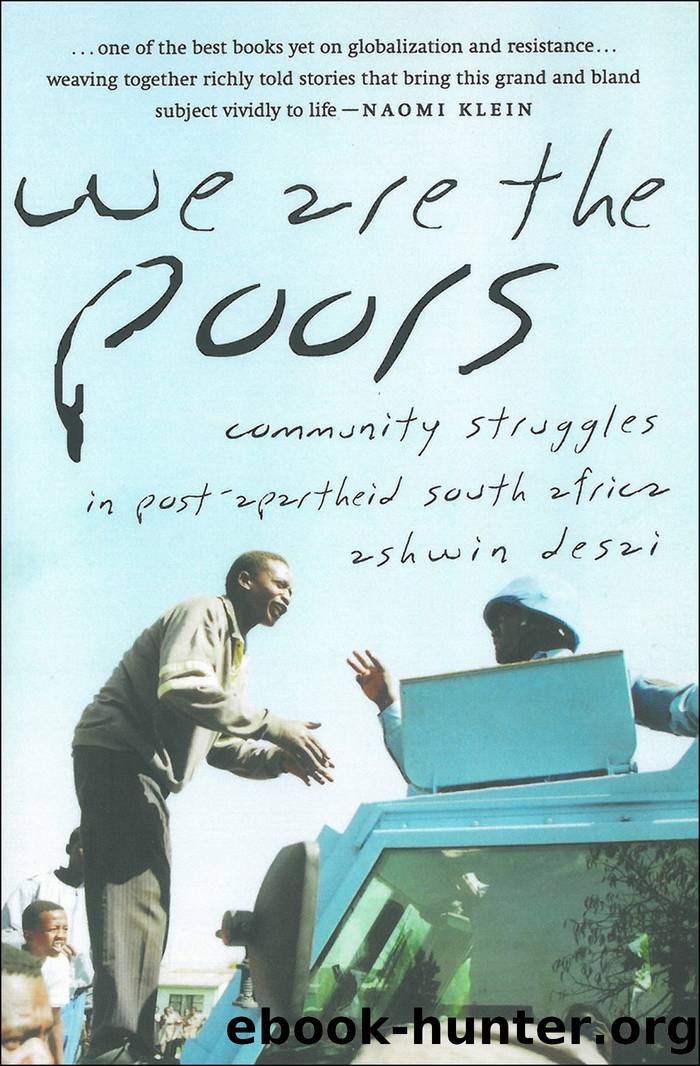We Are the Poors: Community Struggles in Post-Apartheid South Africa by Ashwin Desai

Author:Ashwin Desai [Desai, Ashwin]
Language: eng
Format: epub
Tags: South, Africa, Political Economy, Discrimination, Social Science, Republic of South Africa, Political Science, History, Human Rights
ISBN: 9781583670507
Google: sTUUCgAAQBAJ
Goodreads: 558741
Publisher: Monthly Review Press
Published: 2002-04-01T00:00:00+00:00
14. Fighting Neoliberalism in Soweto and Tafelsig
We donât ask why or when people are cut off, we just switch
them back on. Everyone should have electricity.
âVIRGINIA SETSHEDI, Soweto Electricity Crisis Committee,
November 2001
It does not matter whether the Democratic Alliance or the
ANC rules Cape Town. Both will disconnect our water and evict us
because both have a policy of privatization and neoliberalism.
âSpeaker at an anti-eviction rally, Cape Town, January 2002
IT WAS NOT ONLY IN DURBAN that resistance to the new government and its policies was being bred. Struggles led by independent community-based organizations flared up all over South Africa. Those closer to the action in Soweto in Gauteng and Tafelsig in the Western Cape are better able to make sense of the dramatic developments in these areas. But in the townships of Durban, Cape Town, and Johannesburg the issues were the same: cost recovery was causing government to attack its own citizens in ways reminiscent of the apartheid days.
Trevor Ngwane, a resident and activist from Pimville in Soweto, was one of those who thought that the ANC would be able to address the concerns of the poor by dealing with high service charges, high rents, and the lack of facilities. Deeply rooted in the community, he was elected as a councilor in 1995, representing the ANC. When Walter Sisulu was released from prison and went back to Soweto, he had said, âMuch of Soweto has not changed since I first came to live here in the thirties ⦠With few exceptions the matchbox houses are very much the same. A government who is not addressing the basic issue of decent housing is not seriously committed towards political change.â1
Implicit in Sisuluâs statement was that conditions in Soweto were going to improve once the ANC assumed power. But the reality was that, for many, things were going to get worse and more difficult. The ANC-dominated Johannesburg council, elected in 1995, planned to privatize as many of the councilâs services as possible. This would not only lead to retrenchment of workers but would rapidly hike the price of services and cause a clampdown of unimaginable proportions on those who were too poor to pay for the meager services they were receiving. Trevor Ngwane, newly elected to that council, knew that the logic of cost recovery would not aid his constituency in Soweto and would only serve to deepen their misery. He raised his voice in opposition. He was suspended from the ANC and then expelled.
Trevor Ngwane joined with activists like Virginia Setshedi and Dudu Mphenyeke and began to organize against these policies through an organization called the Soweto Electricity Crisis Committee (SECC).
Residents of Soweto were faced with a concerted policy of electricity cutoffs after the 1999 general election was won by the ANC, who had promised the exact opposite. Some twenty thousand houses had their electricity supplies disconnected every month. (Mail and Guardian, June 8, 2001). Brian Johnson, the manager of Eskom indicated that âthe aim is to disconnect at least 75 percent of Soweto residentsâ (Mail and Guardian, April 6, 2001).
Download
This site does not store any files on its server. We only index and link to content provided by other sites. Please contact the content providers to delete copyright contents if any and email us, we'll remove relevant links or contents immediately.
| Central Africa | East Africa |
| North Africa | Southern Africa |
| West Africa | Algeria |
| Egypt | Ethiopia |
| Kenya | Nigeria |
| South Africa | Sudan |
| Zimbabwe |
Goodbye Paradise(3798)
Men at Arms by Terry Pratchett(2832)
Tobruk by Peter Fitzsimons(2507)
Borders by unknow(2303)
Arabs by Eugene Rogan(2292)
Pirate Alley by Terry McKnight(2218)
Belonging by Unknown(1854)
More Than Words (Sweet Lady Kisses) by Helen West(1853)
It's Our Turn to Eat by Michela Wrong(1725)
The Biafra Story by Frederick Forsyth(1653)
The Source by James A. Michener(1602)
Botswana--Culture Smart! by Michael Main(1597)
Coffee: From Bean to Barista by Robert W. Thurston(1539)
A Winter in Arabia by Freya Stark(1534)
Gandhi by Ramachandra Guha(1528)
The Falls by Unknown(1520)
Livingstone by Tim Jeal(1482)
The Shield and The Sword by Ernle Bradford(1402)
Africa: Altered States, Ordinary Miracles by Richard Dowden(1381)
